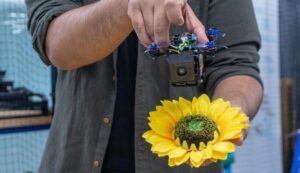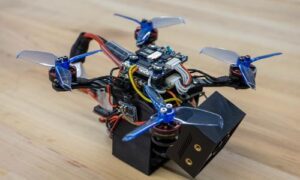
by DRONELIFE Staff Writer Walker Robinson
Continue reading below, or listen:
Images: courtesy Worcester Polytechnic Institute
Researcher Nintin Sanket is working to develop a drone-based solution to the population decline of pollinating species around the world. A third of the world’s food is dependent on pollination from bees, yet they are increasingly threatened by climate change and harmful agricultural practices[1]. Sanket and his team are developing a new strategy to tackle this challenge, utilizing automated drones.
“A lot of conservationists are working to preserve bees. But the climate is changing pretty drastically, so we need alternatives as well, including looking at other ways to pollinate things,” remarked Sanket.
Estimates suggest that half of North American and Hawaiian bee species are currently in decline, and nearly a quarter are at risk of extinction[2]. If conservation alone cannot preserve pollinator populations, human interventions will be critical to supplementing pollination to meet the food production needs of the planet.

Nintin Sanket is the Assistant Professor in the Department of Robotics Engineering at Worcester Polytechnic Institute[3]. His work on “RoboBees” began while he was still in graduate school, and his doctoral dissertation on the topic earned awards at the University of Maryland. Now, he works on a team of doctoral and master’s students to further hone the capabilities of their prototype “RoboBees”.
The most recent prototype is a compact 4.7 inches across with four propellers. It houses a camera, rechargeable lithium battery, and computing system. The entire pollination process is fully automated. The drone locates the flower, flies down to collect pollen, and then moves onto the next flower. Sanket’s team now hopes to increase the drone’s agility, durability, efficiency, and flight time.
While Sanket estimates a fully robotic pollinating swarm is still many years away, there are promising technological innovations happening around the world that may lend themselves to his vision. Researchers at other institutes are finding mechanical solutions that may allow the drone to be lighter and faster than its current state, and Sanket’s own team are applying bee behavioral research in the automated drone’s programming.
The “RoboBee” would undoubtedly have numerous alternative applications across a broad range of industries, but for now Sanket and his team are committed to using it to solve a critical challenge facing the agricultural industry.
- [1] UN Environment: Why Bees are Essential https://www.unep.org/news-and-stories/story/why-bees-are-essential-people-and-planet
- [2] “Pollinators in Peril” – Kopec and Burd. https://www.biologicaldiversity.org/campaigns/native_pollinators/pdfs/Pollinators_in_Peril.pdf
- [3] Sanket’s Dissertation https://drum.lib.umd.edu/items/2daf4660-f208-4d7c-b07d-70a3681b33e7
Read more:
- Researchers Help Underwater Drones Detect Ocean Contaminants, Like Oil Spills or Gas Leaks
- Drones in Agriculture: Part 137 and Leveraging Spraying Drones
- A Drone Carrying an AED Could Save a Heart Attack Victims Life. Researchers Study How to Make it Work
- MIT Researchers Develop New Algorithm to Prevent Drone Collisions
Walker Robinson is a 2022 Graduate of the University of California Santa Barbara with a passion for renewable energy and emerging technologies. An early career professional experienced in both sales and development of residential and utility-scale renewable energy systems, he is delighted to be part of the drone industry.
Miriam McNabb is the Editor-in-Chief of DRONELIFE and CEO of JobForDrones, a professional drone services marketplace, and a fascinated observer of the emerging drone industry and the regulatory environment for drones. Miriam has penned over 3,000 articles focused on the commercial drone space and is an international speaker and recognized figure in the industry. Miriam has a degree from the University of Chicago and over 20 years of experience in high tech sales and marketing for new technologies.
For drone industry consulting or writing, Email Miriam.
TWITTER:@spaldingbarker
Subscribe to DroneLife here.
